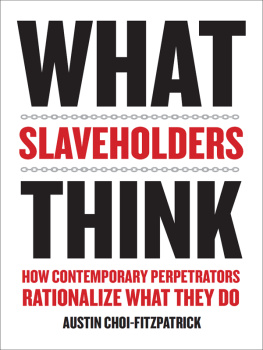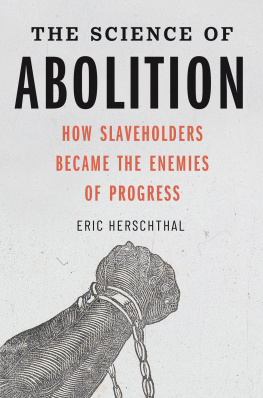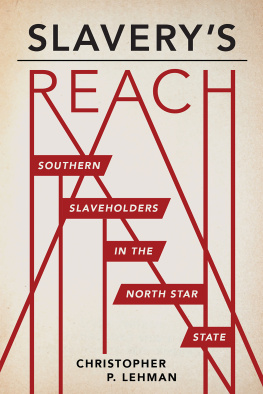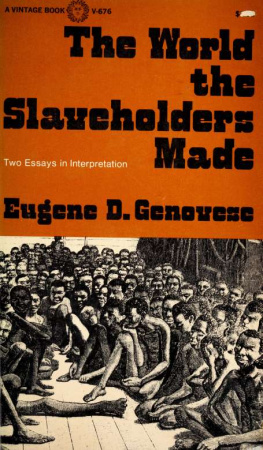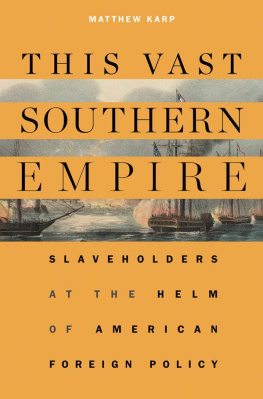Table of Contents
WHAT SLAVEHOLDERS THINK
WHAT SLAVEHOLDERS THINK
HOW CONTEMPORARY PERPETRATORS RATIONALIZE WHAT THEY DO
AUSTIN CHOI-FITZPATRICK
Columbia University Press
New York
Columbia University Press
Publishers Since 1893
New York Chichester, West Sussex
cup.columbia.edu
Copyright 2017 Columbia University Press
All rights reserved
E-ISBN 978-0-231-54382-8
Library of Congress Cataloging-in-Publication Data
Names: Choi-Fitzpatrick, Austin, author.
Title: What slaveholders think: how contemporary perpetrators rationalize what they do / Austin Choi-Fitzpatrick.
Description: New York: Columbia University Press, [2017] | Includes bibliographical references and index.
Identifiers: LCCN 2016028996 (print) | LCCN 2016041855 (ebook) | ISBN 9780231181822 (cloth: alk. paper) | ISBN 9780231543828 (e-book)
Subjects: LCSH: SlaveryHistory21st century. | Human trafficking. | Forced labor.
Classification: LCC HT867 .C46 2017 (print) | LCC HT867 (ebook) | DDC 306.3/620905dc23
LC record available at https://lccn.loc.gov/2016028996
A Columbia University Press E-book.
CUP would be pleased to hear about your reading experience with this e-book at .
Cover design: Jason Heuer
For the children of Issachar
I am a master. I have employed people and done so much for them. I have fulfilled my duties toward my servant. They should realize this and fulfill their duties as a servant and they should maintain that master-servant distance. If we dont supervise our servants then well be finished. So they should understand that there is a difference between master and the servant, and that the masters have a particular role and that the servants have a particular role.
Radhesh (Interviewee 31)
If only it were all so simple! If only there were evil people somewhere insidiously committing evil deeds, and it were necessary only to separate them from the rest of us and destroy them. But the line dividing good and evil cuts through the heart of every human being. And who is willing to destroy a piece of his own heart?
Aleksandr Solzhenitsyn, The Gulag Archipelago
CONTENTS
A cknowledgments have long been my favorite part of a book. Ive felt that between those thanks at the beginningsome fulsome, some begrudgingand the index at the end, one can get a feel for both the author and the work. Its a bit like a house, really; thanks to the institution that kept a roof over my head, thanks to the grants that kept food on the table, and thanks to the friends, family, and colleagues that served as the inspiration, comfort, and distraction for the whole affair. The walls, windows, and doors, of course, are the authors own responsibility. Dont blame others for the draft or the occasional leak.
As for the debts along the way, they are numerous. This book began its life while I was studying at Notre Dame. There I would like to thank Rory McVeigh and Kraig Beyerlein, as well as Daniel J. Myers (Marquette University) and Christian Davenport (University of Michigan). I owe the origin of this book to Rory McVeigh, who encouraged me to focus on perpetrators responses rather than mobilizations origins. What a good idea!and one that echoes something I remember learning from Jack Donnelly many years ago: Always turn dichotomies into a continuum. Many thanks go to Josh Dinsman, Lars Almquist, and Dana Chavarria, for their formatting, editorial, and design chops and to a host of folks for funding, including the Kellogg Institute and the Center for the Study of Social Movements and Social Change, both at Notre Dame, as well as the National Science Foundation.
A very special thanks goes out to colleagues in the United Kingdom and India: Dr. Bhanuja Sharan Lal, Dr. Sunit Singh, Kiran Kamal Prasad, Rajneesh Kumar, Vithika Yadav, Ginny Baumann, and Supriya Awasthi. Their creativity and patience made this research possible. Farheen Husain and I shared many long and dusty drives that always challenged me to dig deeper for answers and ask new questions. I owe a great deal to the following individuals who served as translators and transcriptionists at various points: Shinja Singh, Vinay Yadav, Kullyappa, Bonface Owiti, and Jon Rider. Heartfelt thanks go out to all of our friends who made our years in East Africa so enjoyable, and to Tinna, Francis, Lukas, Nuru, and Fred for keeping our household running smoothly while my wife worked hundred-hour weeks and I spent months alternating between India and a book-piled desk.
I owe a great debt to Wolfgang Reinicke, the founding dean of the School of Public Policy at Central European University, who encouraged me break the rules if necessary and challenge convention when possible. This project benefitted from the research assistance of Marija Stanovska Rupcic, from the close read provided by Pratik Phadule and Erjon Qirollari, and from the encouragement and support of my colleagues, especially Cristina Corduneanu-Huci, Michael Dorsch, Daniel Large, Simon Rippon, Bernhard Knoll, and Robert Templer. At the University of San Diego I would like to thank Patricia Marquez, for carving out the time for me to finish this book, and to Necla Tschirgi, for suggesting the book was written the wrong way round.
This project has developed and improved through reviews and conversations at various times with Doug McAdams, Sarah Soule, Joseph Luders, Jim Jasper, Jeff Goodwin, Ed Walker, Kirsten Foot, Brayden King, Rachel Einwohner, Kathryn Sikkink, Doug Johnson, John Picarelli, Joel Quirk, Kevin Bales, Aidan McQuade, Ann Bunting, Michelle Clark, Brandon Vaidyanathan, Kiran Kamal Prasad, Tom Maher, Leon Oosterwijk, and Farheen Husain. Warm-hearted thanks go to Gina Neff and Phil Howard, for their generous mentorship and friendship.
I have also been fortunate to receive the smart support of Alison Brysk and the kind hospitality of Hank Johnston over the years. This project benefitted from feedback at annual meetings of the American Anthropological Association, American Society of Criminology, International Studies Association, and the American Sociological Association and from reviewers at the Journal of Human Rights and the Journal of Human Trafficking.
I would be remiss if I didnt thank the coffee shops where I hammered these ideas out over conversations or at my machine. In Mawnza: Tilapia and Ryans Bay; in Budapest: Espresso Embassy, My Little Melbourne, and Coyote Caf; in Marquette: Landmark, Ore Dock, and Black Rocks; in San Diego: Influx, Ballast Point, and Bird Rock. A thousand thanks for the double shots.
Slavery will not be ended by yet another book on the topic. It will be ended by people like Jenny Choi, my partner, who has committed her life to increasing opportunity and decreasing inequality the world over. She and our joyous furiesEden Justice and Aila Paxare the future and the hinge on which my life swings. Finally, to Joshua MacIvor-Andersen, for his companionship over all these years. I wouldnt have it any other way.
The worker is my cash machine, my fate.
Aanan (Interviewee 39)
I liked Aanan as soon as I met him. My field notes read What a nice guy, you can just see from his face. His favorite god is the god of truth. Open-faced and conversational, he was enthusiastic about the explosive growth in his quarry operations and excited to show me around. Together we toured the open mines where his workers carve, day by day, into the earth. The process produces boulders, which are broken down into gravel by smaller laborers, often women and children. Together with his laborers, Aanan laughed at my efforts to repeat the process for myself, the sledge high over my head before arcing down, momentarily disappearing into shards and dust.

